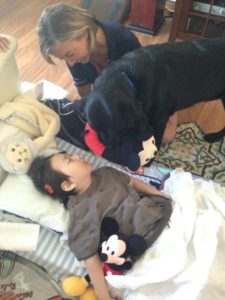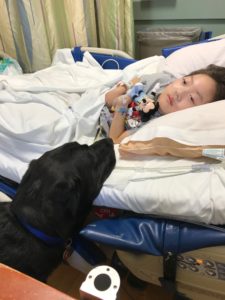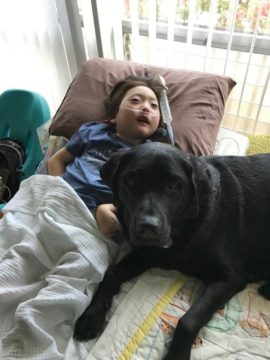A Family’s Missing Piece
People with disabilities are challenged every day, and they are not alone. Family members also face challenges, even in paradises such as Hawaii. This is a truth some families know all too well. In all families, family members are caretakers, first responders, and guardians. But families of children with disabilities face even more challenges. For this family, the family member they needed came well-trained and with four legs and a tail.
Sean and Tomoko’s younger son, Leo, was born deaf and without sight. Around age 3, Leo started to have serious seizures. “It was really hard to watch. Leo’s seizures could last an hour or more and there was nothing I could do,” Tomoko said. Cochlear implants allowed Leo to hear. But his lack of sight and seizures couldn’t be cured. Because of this, Leo’s parents were afraid to leave his side. Sean and Tomoko needed a way to watch Leo at all times that allowed them freedom, too.
When Leo was 6 years old, a physical therapist recommended a seizure alert dog. Seizure alert dogs assist people by barking and alerting others when their partner is seizing. Leo’s parents both grew up around dogs, and they liked the idea for their son. When they saw a facility dog in action, they liked the idea even more.
A facilitator from Assistance Dogs of Hawaii brought a facility dog named Tucker to meet Leo. Leo lit up right away. “Tucker made Leo so happy. Leo kept feeling his fur because it’s soft and warm,” Tomoko said. The encounter gave them enough confidence to apply for a service dog.
Leo and a black Lab named Akamai were paired in 2016, less than six months after they applied for a service dog. Because of the short timeframe, they did not have much time to raise funds. Thanks to the scholarship Leo received from Canines for Disabled Kids, they could pay for Akamai after the pairing. The scholarship not only relieved a large financial burden from Sean and Tomoko, it also got Akamai and Leo paired as fast as possible. This was essential to Leo’s health.
At the time, Akamai was 5 years old and had loads of practice in helping people. Before he was trained to alert for seizures, Akamai worked as a facility dog at a Veterans Affairs hospital in Hawaii. Only a third of dogs pass the training to become service dogs, but Akamai handled every curveball and more. His calm attitude and wide range of skills made Akamai a perfect fit for Leo.
 Not only did Akamai alert Leo’s parents of seizures, he also predicted them, and stopped most of them, too. “There’s no explanation why or how Akamai learned how to stop Leo’s seizures, but he did at least 90 percent of the time,” Tomoko said. The duo was never apart, which meant Tomoko could worry less. “Knowing that Akamai was there to help really made a big difference in my life. I could step away and relax,” Tomoko said, “Before, I never left Leo alone.” Less than a year after Akamai and Leo’s pairing, Leo’s health declined. He spent his final days fighting in the hospital alongside his service dog, his brother and his parents.
Not only did Akamai alert Leo’s parents of seizures, he also predicted them, and stopped most of them, too. “There’s no explanation why or how Akamai learned how to stop Leo’s seizures, but he did at least 90 percent of the time,” Tomoko said. The duo was never apart, which meant Tomoko could worry less. “Knowing that Akamai was there to help really made a big difference in my life. I could step away and relax,” Tomoko said, “Before, I never left Leo alone.” Less than a year after Akamai and Leo’s pairing, Leo’s health declined. He spent his final days fighting in the hospital alongside his service dog, his brother and his parents.
While in the hospital, Akamai knew his job wasn’t only to protect Leo. His family needed him now more than ever. “Even though he was paired with Leo, Akamai is a service dog for all of us. I could tell he was sad and really missed Leo after he passed. But Akamai knew he needed to be strong for Kai, Tomoko and me,” Sean said. Akamai put his facility dog training to the test and cared for the family, especially Kai, after Leo’s death. “He just has a way of making everybody feel better,” Sean said.
Now a mellow 8 years old, Akamai is starting to slow down. But he’s just as smart as ever. Just like the boy he was paired with, Akamai inspires every day. Leo’s legacy rests firmly in the hearts of his family and many others lucky enough to have met him. They urge families to ask questions and to do the work if they really think a service dog is right for their family. They want families to know that service dogs change the lives of more than just their partners and are well worth the time and money. “I really don’t know where we’d be without Akamai” Sean said.
- Justin Ouellette
Justin is a Professional Communication and Journalism recent graduate of University of Maine, Presque Isle (2020)












